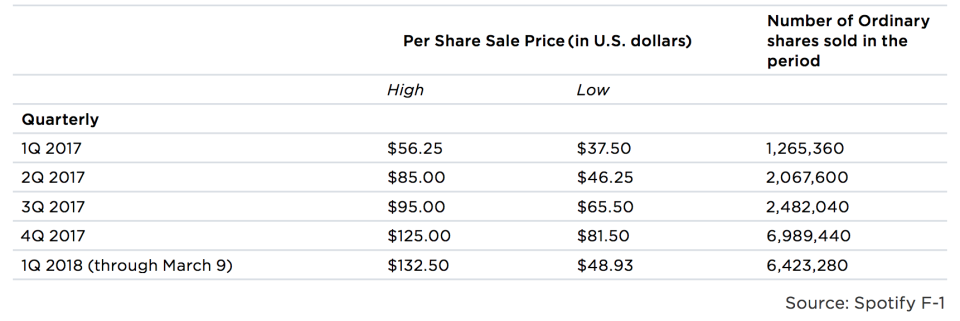Spotify's odd IPO has big money pouring into the private secondary market
Spotify’s (SPOT) direct listing at the New York Stock Exchange is a “novel method” and almost anti-Wall Street: The IPO is not being underwritten and there is no bank building a book, soliciting orders to buy or sell shares. Therefore big banks will only make a fraction of the fees typically associated with a big IPO.
But some big institutional investors can still get their hands on shares of the red-hot music streaming company before its public debut Tuesday — in the robust private secondary market. Over the past three months, more than 7.8 million Spotify shares have been sold in the private secondary market, which mainly caters to institutional investors and accredited investors with a net worth of at least $1 million. The shares sold is 11% more than the previous quarter and accounts for 4.4% of 178,112,840 total shares outstanding.
Equidate, a platform for trading private technology firms’ stock, says it transacted more than $150 million worth of Spotify stock in the past three months, more than twice of all Spotify transactions on Equidate in 2017. The platform also reports more activity in Spotify relative to other highly anticipated tech IPOs including Snap, Dropbox and Square.
“Given the lack of IPO allocations for investors, there has been a strong uptick in institutional activity in Spotify prior to its listing,” Rob Hilmer, head of business development at Equidate, told Yahoo Finance. As of March 30, Spotify traded at a suggested share price of $5275 (before a 40-1 split) on the platform, which implies a company valuation of $22.5 billion.
Spotify has made trading on the private secondary market easier

The private secondary market has been eyeing the popular, consumer-facing music streaming platform for the past 18 months. Unlike some startups, which put trading restrictions on the private secondary market, the Stockholm-based company has been fairly open about its early investors and employees trading shares. Spotify has also facilitated transactions in the hope that this could help stabilize its IPO price.
Since Spotify is listing its shares directly and does not have an underwriter there is limited pricing information available and, no set price range in its highly anticipated IPO. The company wants to utilize the private secondary market as a tool to stabilize its share price and hint at the right price.
To buoy the private market, in December 2017 Spotify increased the weighting of transactions to 50% from 20% of the fair value of total ordinary shares “in consideration of an increased volume in private market transactions.” While Spotify has no plan to issue new shares once it goes public, it issued 10 million more shares in the private secondary market last quarter. The company has also waived its ability to purchase shares in the private secondary market before anyone else can, a further push to encourage trading.
Investors tend to hold on to shares longer and stock volatility is typically lower in the private secondary market, but that has not been the case for Spotify. In March alone, a share of Spotify traded from $48.93 to $125.00, a difference of 155%, according to PitchBook.
Cameron Stanfill, an analyst at PitchBook says trading shares in the private secondary market can help set a benchmark for Spotify’s IPO price. “These transactions also provide existing shareholders the opportunity to sell before the listing, getting rid of ‘pent-up’ demand and potentially reducing early volatility on the public markets,” Stanfill wrote in a research note.
If the private market turns out to be an accurate prediction of Spotify’s initial public price, Stanfill believes more companies will follow Spotify to use the private secondary market for price discovery before IPO.
Krystal Hu covers technology and economy for Yahoo Finance. Follow her on Twitter
Read more:
Apple CEO Tim Cook on Facebook data leak: Regulation is necessary
